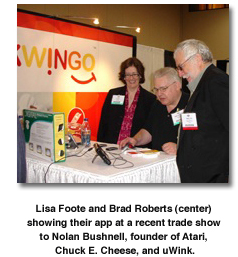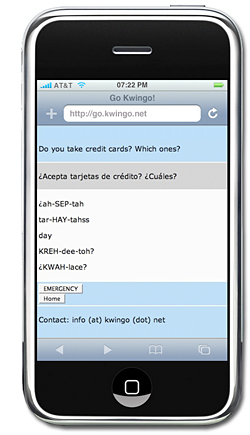 What do you do when you’re a successful, female, mid-career IT and operations executive with several big-name companies, and you decide to try something different? Why, you launch a mobile web apps company, that’s what!
What do you do when you’re a successful, female, mid-career IT and operations executive with several big-name companies, and you decide to try something different? Why, you launch a mobile web apps company, that’s what!
Actually Lisa Foote first took some time to give back by using her executive skills for a year or so of non-profit charity work (with the United Way of Minnesota), after successful stints at Target, GE Capital, and Prudential. But it wasn’t long when the for-profit drive was back, and soon she was plotting, with husband Brad Roberts, a new business idea for solving language challenges in today’s increasingly global economy. And it just so happened that Web 2.0 technology was going to play a part — because Brad, who has a highly eclectic creative and business background, had become a self-taught Ruby on Rails developer.
The Birth of Kwingo
Foote and Roberts newly discovered life as entrepreneurs soon resulted in the birth of Kwingo.net, a venture they introduced earlier this year. Its mission is to bring simple, useful productivity tools to professionals working in field occupations using web-based mobile devices as a platform for delivery.
With her experience working in large enterprises, Foote knew that labor workforces were continuing to globalize, and that language challenges would just continue to multiply. Kwingo would provide the tools workers in the field needed to communicate with coworkers who speak a different language, helping everyone work more productively and safely.
The company’s first application serves commercial kitchens in restaurants and institutions, providing thousands of food-prep and cooking phrases in English and Spanish. The application can be accessed on any web-enabled handset, PDA, or PC-type device, and usage is free for workers. This fast, intuitive tool provides the most frequently used productivity and safety phrases in English and Spanish, with Spanish pronunciation. Supervisors and their workers can use the Kwingo food-prep application immediately on their cell phones, PDAs, or even a touch-screen tablet PC in the kitchen, with no instruction necessary, thanks to the now almost universally understood cell phone interface.
 “The best mobile applications will be built from scratch specifically for mobile devices,” said Foote. “Kwingo will be a leading provider of such applications. Our obsession is to deliver simple, useful tools to professionals working in all mobile occupations.”
“The best mobile applications will be built from scratch specifically for mobile devices,” said Foote. “Kwingo will be a leading provider of such applications. Our obsession is to deliver simple, useful tools to professionals working in all mobile occupations.”
How big is the market? Here are some numbers just for starters: in the U.S., there are 3.1 million Hispanic workers in food preparation and serving occupations, 2.5 million in construction, and 1.6 million in building-grounds cleaning and maintenance. That’s 7.2 million Hispanic workers in these three sectors alone. Restaurants are the number-one employer of Hispanics with limited English proficiency, so that seemed to Foote and Roberts the place to begin.
Kwingo provides custom web sites with proprietary food names and operating procedures unique to a specific restaurant company or chain, as well as free public-use web sites. It also is open to providing Kwingo apps on an OEM basis to existing web-based technology providers (there are several in the restaurant industry), where their language app would be branded by these big-name providers.
Other industries Kwingo will pursue include hotel/hospitality, for which it will introduce an application this summer, and soon the construction industry. For any of the large enterprises in these industries, Kwingo offers cost-effective, fast development of language and operation manuals for all workers in all their locations. It enables corporations with many locations to be more environmentally friendly by eliminating most or all paper-based operations instructions. Kwingo’s new “online manuals” can always be kept up to date without expensive reprinting. And Kwingo can communicate critical information alerts daily to workers in the field who have no access to voicemail or email.
Kwingo generates revenue through fees for developing custom, constantly updated web sites unique to each company’s needs, and, in the future, through advertising to individuals who use the public Kwingo web sites free of charge. “The highly focused, differentiated versions of our mobile application – for verticals such as food service, hospitality, construction, and landscaping, among others – will give advertisers access to highly targeted buyers,” said CEO Foote. “This powerful model will deliver ad impressions multiple times per day – in the buyers’ hands, at the workplace.”
Kwingo mobile applications – using both its Kwingo.net and Kwingo.mobi domains – will provide opportunities for “location-based advertising,” which Foote noted that Google CEO Eric Schmidt has predicted would be “a very, very good business.” She said, “Kwingo’s location-based advantage for advertisers is knowing exactly which professionals – chefs, landscapers, construction supervisors, etc – are using an application, and knowing these users of the application at the worksite are buyers of specific products.”
A Mobile Phone App for International Travelers
 Just this week, Kwingo is announcing a new service for English-speaking consumers to get instant access to travel phrases in Spanish simply by going to http://go.kwingo.net (note no “www”) on their web-enabled cell phone or PDA. The service is totally free, and pronunciation is provided for all words and phrases. It is expected that the site will carry advertising in the future.
Just this week, Kwingo is announcing a new service for English-speaking consumers to get instant access to travel phrases in Spanish simply by going to http://go.kwingo.net (note no “www”) on their web-enabled cell phone or PDA. The service is totally free, and pronunciation is provided for all words and phrases. It is expected that the site will carry advertising in the future.
“We designed this web application to be extremely simple and fast,” said Lisa Foote, Kwingo’s CEO. “Anyone who can click on a link can use it. Talk about instant gratification – you can find the right phrase and be saying it before the next guy can even find his dictionary in his bag! It’s the right tool for the modern traveler.”
The Go.Kwingo(TM) site was specifically designed for the small screens of mobile phones, with a simple, clear interface for fast access to the right category of phrases when a traveler is on the go. The home page has six simple links that take you instantly to separate screens with phrases related to Hotel, Dining, Transportation/Directions, Recreation/Concierge, and Banking – plus, there’s a helpful Pronunciation screen, which includes general tips and how to pronounce days, times, numbers, and months.
Each of the more than 200 travel-related phrases provided by Go.Kwingo(TM) is displayed on the user’s mobile phone screen complete with phonetic pronunciation. For example, for the phrase “Do you take credit cards?” the Spanish is “?Acepta tarjetas de credito?” Go.Kwingo(TM) provides the following phonetic pronunciation, each word on a separate line on the screen for ease of reading: ?ah-SEP-tah … tar-HAY-tahss … day … KREH-dee-toh?
Millions of Americans will be traveling internationally this summer. Mexico is the eighth most popular tourist destination according to the World Tourism Organization, and Central and South American countries are becoming increasingly popular for U.S. travelers. A recent analysis by USA Today found that summer travel season is even busier than holiday travel. Thus, the introduction of the Go.Kwingo(TM) site now is quite opportune – especially since virtually all travelers who own cell phones travel with them.
For Foote, who holds an MBA from the University of St. Thomas, the future for Kwingo is wide open. She’s having fun, attending more than half a dozen industry events in that past four months to introduce Kwingo — as detailed on the company’s web site. CIO Roberts, whose experience includes extensive business communications work with firms including Shell Oil, Navistar International, IBM, and the Carlson Companies, is now living a whole new life as the developer of the Kwingo software applications. For more on Kwingo, including video interviews, see their News page, and this StarTribune article. Kwingo’s seed-stage funding was provided by the founders. It expects to seek additional capital for expansion.
(Disclosure: Kwingo has been a consulting client of mine.)